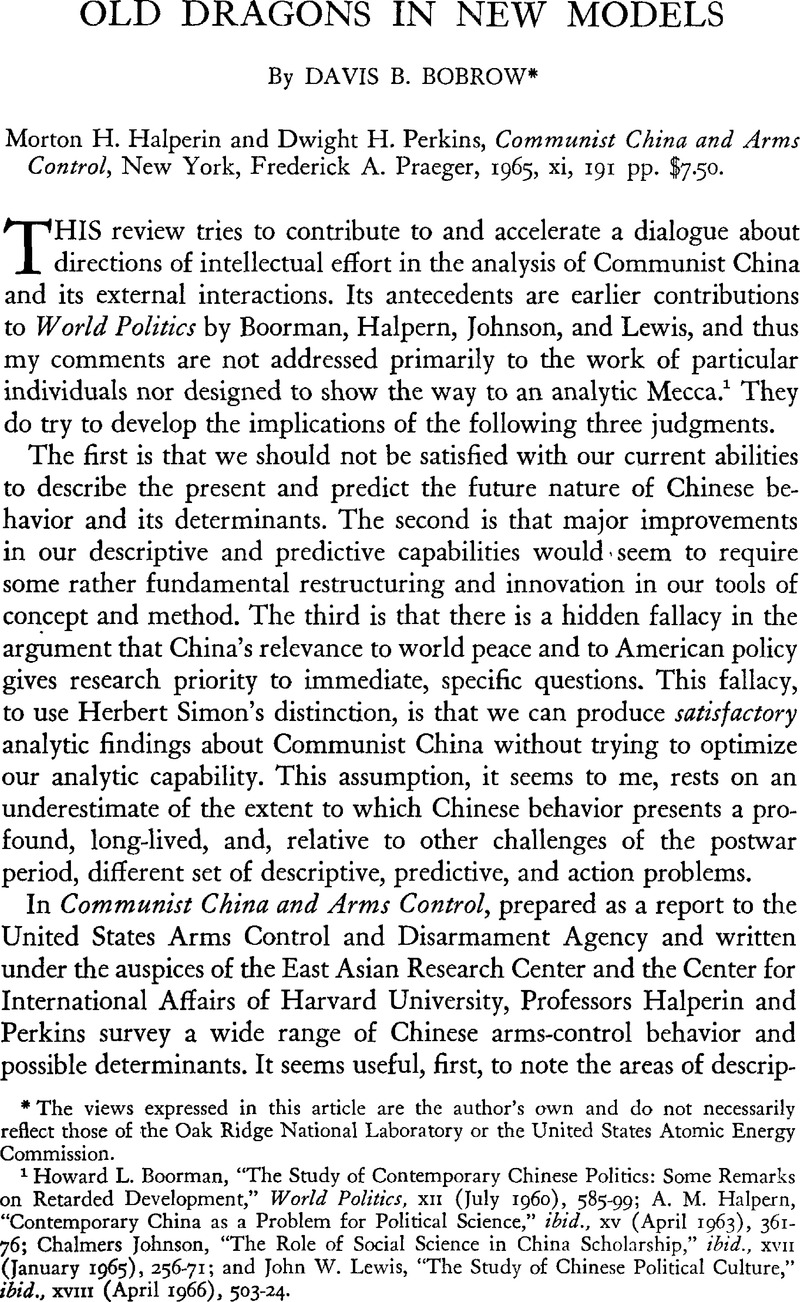Article contents
Old Dragons in New Models
Published online by Cambridge University Press: 18 July 2011
Abstract

- Type
- Review Article
- Information
- Copyright
- Copyright © Trustees of Princeton University 1967
References
1 Boorman, Howard L., “The Study of Contemporary Chinese Politics: Some Remarks on Retarded Development,” World Politics, xii (July 1960), 585CrossRefGoogle Scholar–99; A. M. Halpern, “Contemporary China as a Problem for Political Science,” ibid., xv (April 1963), 361–76; Chalmers Johnson, “The Role of Social Science in China Scholarship,” ibid., xvn (January 1965), 256–71; and John W. Lewis, “The Study of Chinese Political Culture,” ibid., xviii (April 1966), 503–24.
2 Lasswell, Harold D., “The Relation of Ideological Intelligence to Public Policy,” Ethics, LIH (October 1942), 25–34.CrossRefGoogle Scholar
3 See Secretary Rusk's statement of March 16, 1966, to the Far East Subcommittee of the House Foreign Affairs Committee, reported in the New York Times, March 17, 1966.Google Scholar
4 I had the pleasure of participating in the first of these conferences and of commenting on an early draft of the final report.
5 Pye, Lucian W., “Coming Dilemmas for China's Leaders,” Foreign Affairs, XLIV (April 1966), 387–402.CrossRefGoogle Scholar
6 The national actor approach does not exclude the use of subnation data but does aggregate them to place the nation on a particular position for the relevant variables, e.g., similarity of political participation in urban and rural areas.
7 In using the following sources, I do not intend any positive or negative judgment on the accuracy of their data. Russett, Bruce M. and Alker, Hayward R. Jr., Deutsch, Karl W., Lasswell, Harold D., World Handbook of Political and Social Indicators (New Haven 1964)Google Scholar; Banks, Arthur S. and Gregg, Phillip M., “Grouping Political Systems: Q-Factor Analysis of A Cross-Polity Survey,” American Behavioral Scientist, ix (November 1965), 3–6CrossRefGoogle Scholar; Banks, Arthur S. and Textor, Robert B., A Cross-Polity Survey (Cambridge, Mass., 1963Google Scholar); Ivanoff, D., International Environment Evaluation System, Douglas Missile and Space Systems Division, Report SM-51925 (Santa Monica, January 1966Google Scholar).
8 In using these sources I again do not intend any positive or negative judgment on the accuracy of their data. Banks and Gregg, “Grouping Political Systems”; Bruce Sievers, The Divided Nations: International Integration and National Identity, Stanford Studies of the Communist System, Research Paper No. n (March 1966); Dennis C. Pirages, Socio-Economic Development and Political Change in the Communist System, ibid., No. 9 (January 1966); Maurice David Simon, Communist System Interaction with the Developing States, 1954–1962: A Preliminary Analysis, ibid., No. 10 (January 1966); Ivanoff, International Environment Evaluation System.
9 The studies reviewed are McClelland, Charles C., The Communist Chinese Performance in Crisis and Non-Crisis: Quantitative Studies of the Taiwan Straits Confrontation, 1950–1964, Behavioral Science Group, Naval Ordnance Test Station, China Lake, California (December 1965Google Scholar); Martin George Zaninovich, An Empirical Theory of State Response: The Sino-Soviet Case, Stanford Studies in International Conflict and Integration (August 1964); Ole R. Holsti, East-West Conflict and Sino-Soviet Relations, ibid. (December 1964); and Robert C. North, Jan F. Triska, Richard A. Brody, Ole R. Holsti, Anne Armour, A. Odell Osteen, Jr., The Analysis of International Tension, ibid., (June 1964).
10 Rusk, statement of March 16, 1966.
11 My thinking in this area has benefited from conversations with Raoul Naroll.
12 My thinking in this area has benefited from conversations with Rudolph J. Rummel.
- 2
- Cited by


